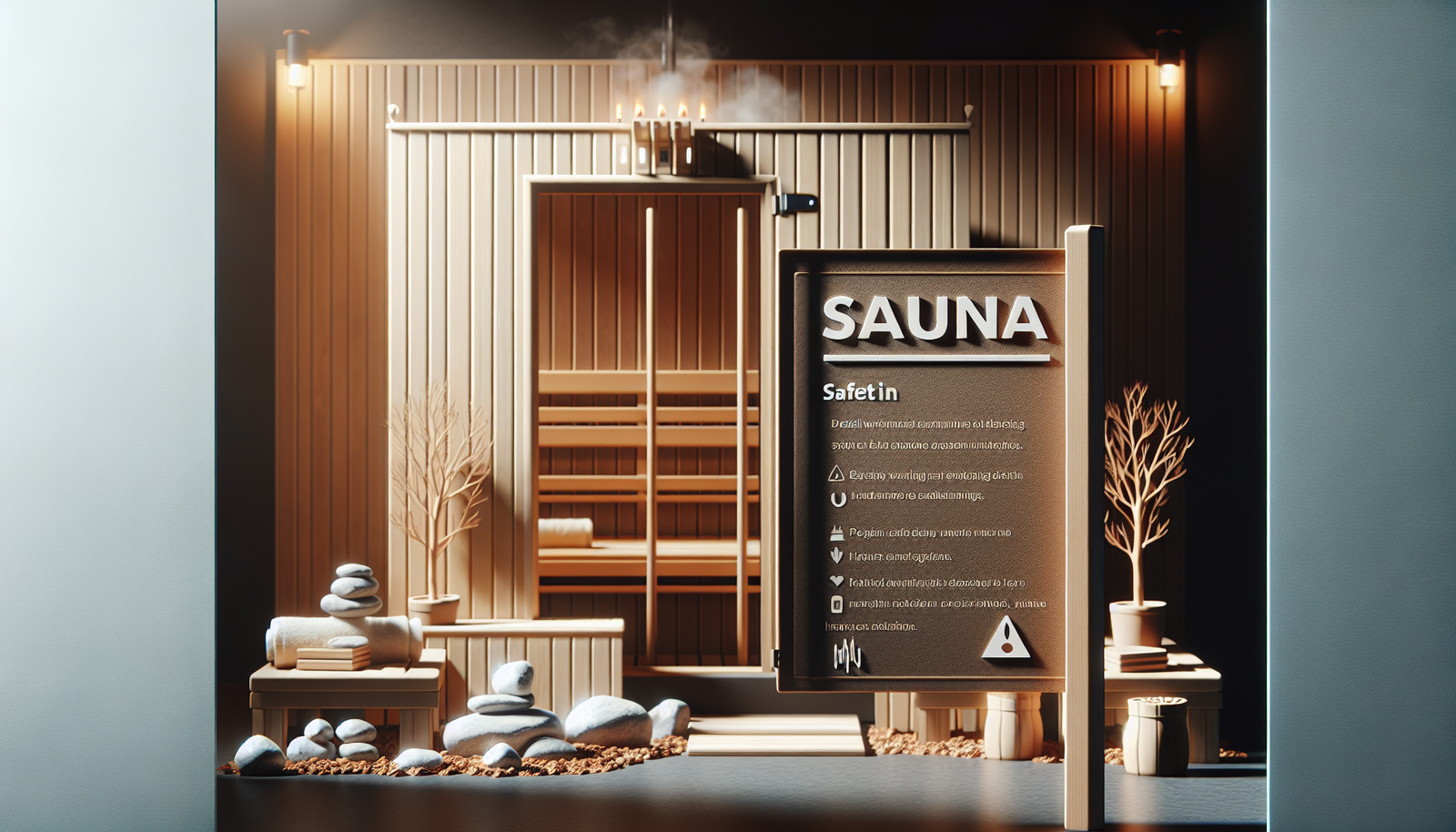So you’re thinking about taking a relaxing trip to the sauna, but you’re concerned about your health conditions and whether they might be a barrier. You’re in the right place! In this article, we’ll shed some light on the health conditions that may require you to steer clear of the sauna. By understanding these conditions and their potential risks, you’ll be able to make an informed decision and ensure a safe and enjoyable sauna experience. Let’s dive in!
Cardiovascular Conditions
Hypertension
If you have hypertension, or high blood pressure, it is important to be cautious when using a sauna. The high temperatures and heat exposure in a sauna can cause your blood pressure to rise even more, which can put extra strain on your heart. This can be dangerous and lead to complications, such as heart attacks or strokes. It is recommended to consult with your healthcare provider before using a sauna if you have hypertension.
Coronary artery disease
Individuals with coronary artery disease should also approach sauna use with caution. This condition occurs when the blood vessels that supply oxygen-rich blood to the heart become narrow and hardened. The high temperatures in a sauna can increase your heart rate and potentially reduce blood flow to the heart, which can be risky for those with this condition. Speak with your doctor before using a sauna if you have coronary artery disease.
Heart valve disorders
Heart valve disorders refer to conditions affecting the valves that regulate blood flow through the heart. The heat and humidity in a sauna can put additional stress on the heart, especially if the valves are not functioning properly. It is crucial to consult with your healthcare provider before using a sauna if you have a heart valve disorder to ensure it is safe for you.
Congenital heart defects
Congenital heart defects are structural abnormalities in the heart that are present at birth. These conditions can affect the heart’s ability to pump blood effectively. Sauna use may increase the workload of the heart, potentially causing complications in individuals with congenital heart defects. It is advisable to seek medical advice before using a sauna if you have been diagnosed with any congenital heart defects.
Respiratory Conditions
Asthma
Asthma is a chronic respiratory condition characterized by inflammation and narrowing of the airways, leading to breathing difficulties. The high heat and humidity in a sauna can trigger an asthma attack in some individuals. Additionally, the presence of airborne irritants in saunas, such as chlorine or fragrances, can further exacerbate asthma symptoms. If you have asthma, it is prudent to consult with your doctor before using a sauna to assess whether it is suitable for your condition.
Chronic obstructive pulmonary disease (COPD)
Chronic obstructive pulmonary disease is a progressive lung disease that causes breathing difficulties. The hot and humid environment in a sauna can be challenging for individuals with COPD, as they may already have reduced lung function. Sauna use may lead to shortness of breath, wheezing, or coughing in these individuals. It is crucial to discuss sauna use with your healthcare provider if you have COPD to determine if any precautions or limitations are necessary.
Bronchitis
Bronchitis is an inflammation of the bronchial tubes that carry air to the lungs. Sauna use can potentially worsen the symptoms of bronchitis, such as coughing, chest congestion, and difficulty breathing. The hot air in the sauna can irritate the already inflamed bronchial tubes, making it uncomfortable and potentially harmful. Consult with your doctor before using a sauna if you have bronchitis or are recovering from a recent episode.
Pneumonia
Pneumonia is an infection that causes inflammation in the air sacs in one or both lungs. The heat and humidity in a sauna may hinder the healing process and aggravate the symptoms of pneumonia. Additionally, sharing a sauna with others may increase the risk of spreading infectious respiratory illnesses. It is essential to wait until you have fully recovered from pneumonia before considering sauna use and to follow your healthcare provider’s recommendations.

Neurological Conditions
Epilepsy
Epilepsy is a neurological disorder characterized by recurrent seizures. The heat and potential dehydration that can occur in a sauna may lower the seizure threshold in individuals with epilepsy. It is crucial to consult with your neurologist before using a sauna if you have epilepsy to assess whether it is safe for your specific condition.
Migraine headaches
Migraine headaches are a type of headache characterized by intense pain, often accompanied by other symptoms such as sensitivity to light and sound, nausea, and vomiting. Sauna use can potentially trigger or worsen migraines in susceptible individuals. The heat, humidity, and potential dehydration can act as triggers for migraines. If you experience migraines, it is advisable to discuss using a sauna with your healthcare provider to determine if it is suitable for you.
Multiple sclerosis
Multiple sclerosis is a chronic autoimmune disease that affects the central nervous system. Heat sensitivity is a common symptom of multiple sclerosis, and exposure to high temperatures in a sauna can potentially worsen symptoms in individuals with this condition. Sauna use may lead to increased fatigue, weakness, and worsened coordination. It is crucial to discuss sauna use with your doctor if you have multiple sclerosis to ensure your safety and well-being.
Parkinson’s disease
Parkinson’s disease is a progressive neurological disorder that affects movement and coordination. The high temperatures in a sauna can lead to increased sweating and potential dehydration in individuals with Parkinson’s disease. Dehydration can exacerbate symptoms such as dizziness, lightheadedness, and muscular weakness. It is advisable to consult with your healthcare provider before using a sauna if you have Parkinson’s disease to determine if any precautions need to be taken.
Diabetes
Type 1 diabetes
Type 1 diabetes is a chronic condition where the body does not produce insulin, the hormone responsible for regulating blood sugar levels. Sauna use can potentially lower blood sugar levels and increase the risk of hypoglycemia in individuals with type 1 diabetes. It is crucial to monitor blood sugar levels closely before, during, and after sauna sessions and to consult with your healthcare provider for specific guidelines on managing your diabetes in the sauna.
Type 2 diabetes
Type 2 diabetes is a metabolic disorder characterized by insulin resistance and high blood sugar levels. Sauna use can potentially improve insulin sensitivity, but it is essential to monitor blood sugar levels carefully and work with your healthcare provider to adjust any diabetes medications accordingly. It is advisable to seek medical advice before using a sauna if you have type 2 diabetes to ensure proper management of your condition.
Diabetic neuropathy
Diabetic neuropathy refers to nerve damage caused by diabetes. Symptoms can include pain, numbness, tingling, and loss of sensation. Sauna use may potentially increase the risk of burns or injury due to reduced sensation in the extremities. Consulting with your healthcare provider before using a sauna is essential if you have diabetic neuropathy to ensure precautions are taken to prevent any potential harm.

Kidney Conditions
Chronic kidney disease
Chronic kidney disease is a progressive condition where the kidneys become damaged and lose their ability to function properly. The heat and dehydration that can occur in a sauna can put additional strain on the kidneys and potentially worsen kidney function. Sauna use should be avoided or limited in individuals with chronic kidney disease, and it is crucial to discuss sauna use with your healthcare provider to determine if it is safe for your specific situation.
Kidney stones
Kidney stones are hard deposits that form in the kidneys and can cause severe pain and discomfort. The heat and dehydration that can occur in a sauna may increase the risk of dehydration and potentially promote the formation of kidney stones. It is advisable to avoid sauna use if you have a history of kidney stones and discuss with your healthcare provider if sauna use aligns with your treatment plan.
Polycystic kidney disease
Polycystic kidney disease is an inherited condition where numerous fluid-filled cysts develop in the kidneys. These cysts can cause the kidneys to enlarge and lose function over time. Sauna use can potentially worsen kidney function or lead to complications in individuals with polycystic kidney disease. It is essential to consult with your doctor before using a sauna if you have this condition to ensure it is safe for your specific situation.
Liver Conditions
Liver cirrhosis
Liver cirrhosis is a late stage of scarring (fibrosis) of the liver caused by various liver diseases and conditions, such as hepatitis and chronic alcohol abuse. The heat in a sauna can potentially put additional stress on the liver and worsen symptoms in individuals with liver cirrhosis. It is vital to consult with your healthcare provider before using a sauna if you have liver cirrhosis to ensure it is safe for your specific condition.
Hepatitis
Hepatitis refers to inflammation of the liver, commonly caused by viral infections or excessive alcohol consumption. The heat and potential dehydration in a sauna can put additional strain on the liver and potentially worsen symptoms in individuals with hepatitis. Consult with your doctor before using a sauna if you have hepatitis to assess if any precautions or limitations are necessary.
Skin Conditions
Eczema
Eczema is a chronic skin condition characterized by dry, itchy, and inflamed skin. The heat and high humidity in a sauna can potentially worsen eczema symptoms and trigger flare-ups. Additionally, the presence of certain irritants in saunas, such as chlorine or fragrances, can further irritate sensitive skin. It is advisable to discuss sauna use with your dermatologist if you have eczema to determine whether it is suitable for your condition.
Psoriasis
Psoriasis is a chronic autoimmune disease that causes the rapid buildup of skin cells, resulting in thick, red, and scaly patches. The high temperatures in a sauna can cause excessive sweating, which may further irritate and exacerbate psoriasis symptoms. The dry heat can also dehydrate the skin, potentially worsening the condition. Seeking advice from your dermatologist before using a sauna is essential if you have psoriasis.
Rosacea
Rosacea is a chronic skin condition characterized by redness, flushing, and the development of small, visible blood vessels on the face. The heat and elevated temperatures in a sauna can trigger or worsen rosacea symptoms, including increased redness and flushing. It is advisable to consult with your dermatologist before using a sauna if you have rosacea to determine if sauna use is suitable for your specific condition.
Pregnancy
First trimester
During the first trimester of pregnancy, the fetus is in a crucial developmental stage. Exposure to high temperatures in a sauna, such as hot tubs or steam rooms, can potentially increase the risk of birth defects or pregnancy complications. It is recommended to avoid using saunas during the first trimester of pregnancy to ensure the safety and well-being of both the mother and the developing fetus.
High-risk pregnancies
In high-risk pregnancies, where there are already existing complications or concerns, sauna use should be avoided altogether. The high temperatures, potential dehydration, and increased heart rate associated with sauna use can pose significant risks to the health of both the mother and the baby. It is crucial to consult with your healthcare provider if you have a high-risk pregnancy to determine if sauna use is contraindicated in your specific situation.
Infections
Active infections
If you have an active infection, such as a respiratory infection or a skin infection, it is advisable to refrain from using saunas. The high temperatures and potential exposure to others in a sauna environment can increase the risk of spreading the infection to others. It is important to prioritize the health and safety of both yourself and those around you by avoiding sauna use until you have fully recovered from the infection.
Open wounds or sores
Having open wounds or sores increases the risk of infection. Saunas provide an environment with elevated temperatures and humidity, which can promote bacterial growth and potentially increase the risk of infection in open wounds. It is advisable to avoid sauna use if you have open wounds or sores to prevent complications and promote proper wound healing.
Medication and Substance Use
Beta blockers
Beta blockers are medications often prescribed to treat conditions such as hypertension and heart rhythm disorders. Sauna use, particularly in high temperatures, can enhance the effect of beta blockers, potentially leading to an excessive decrease in heart rate or blood pressure. It is crucial to consult with your healthcare provider if you are taking beta blockers before using a sauna to assess any potential risks or adjustments to medication dosages.
Antidepressants
Antidepressant medications, such as selective serotonin reuptake inhibitors (SSRIs) or tricyclic antidepressants, can affect the body’s response to heat. Sauna use in combination with these medications can potentially cause excessive sweating, increased body temperature, and an increased risk of dehydration or heat stroke. Discuss sauna use with your doctor if you are taking antidepressants to determine if any precautions need to be taken.
Alcohol or drug intoxication
Sauna use while under the influence of alcohol or drugs is strongly discouraged. Both alcohol and drug intoxication can impair judgment, alter body temperature regulation, and hinder the body’s ability to perceive and respond to heat-related risks. Saunas should only be used when in a clear and sober state of mind to ensure personal safety and prevent potential accidents or health complications.
In conclusion, while saunas can offer relaxation and potential health benefits, it is crucial to consider your specific health condition and consult with your healthcare provider before using a sauna. Individuals with cardiovascular conditions, respiratory conditions, neurological conditions, certain skin conditions, specific pregnancy stages or high-risk pregnancies, active infections, open wounds, or sores, as well as those taking certain medications or under the influence of alcohol or drugs, should exercise caution or avoid sauna use altogether. Prioritizing your health and safety is essential, and seeking professional advice will ensure the most appropriate and safe decision regarding sauna use for your individual circumstances.

